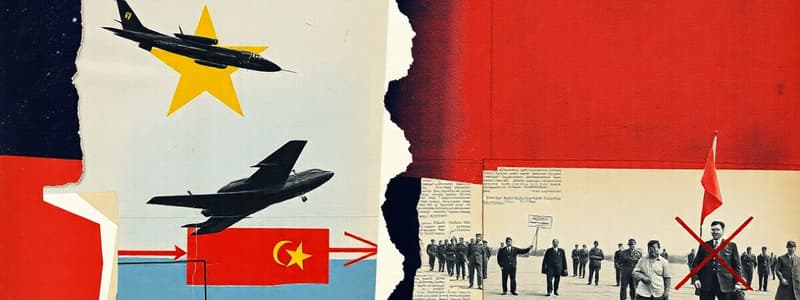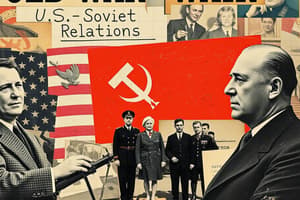Podcast
Questions and Answers
The Cold War was an ideological conflict between the Eastern bloc led by the USSR and the Western bloc led by the ______.
The Cold War was an ideological conflict between the Eastern bloc led by the USSR and the Western bloc led by the ______.
USA
After World War II, the new international system that featured two competing superpowers was known as ______.
After World War II, the new international system that featured two competing superpowers was known as ______.
Bipolarity
The ______ Policy was a US strategy during the Cold War to prevent the spread of Communism.
The ______ Policy was a US strategy during the Cold War to prevent the spread of Communism.
Containment
The ______ Bloc consisted of countries in Eastern Europe aligned with the Soviet Union during the Cold War.
The ______ Bloc consisted of countries in Eastern Europe aligned with the Soviet Union during the Cold War.
The ______ Conference was a pivotal meeting in February 1945 that aimed to shape the post-war world order.
The ______ Conference was a pivotal meeting in February 1945 that aimed to shape the post-war world order.
After the Cold War, the international system characterized by a single superpower is referred to as ______.
After the Cold War, the international system characterized by a single superpower is referred to as ______.
The concept advocating for a classless society where the means of production are owned communally is called ______.
The concept advocating for a classless society where the means of production are owned communally is called ______.
The ______ Policy aimed to isolate the Soviet Union through military alliances and strategic deployments.
The ______ Policy aimed to isolate the Soviet Union through military alliances and strategic deployments.
Socialism is characterized by ______ ownership of the means of production.
Socialism is characterized by ______ ownership of the means of production.
The ______ Policy was intended to fill the void left by European powers after their withdrawal from colonies.
The ______ Policy was intended to fill the void left by European powers after their withdrawal from colonies.
Flashcards
Communism
Communism
A political ideology advocating a classless society with communal ownership of production, adopted by the USSR.
Encirclement Policy
Encirclement Policy
A strategy employed by the Western bloc to isolate the Soviet Union through military alliances and deployments.
Ideological Struggle
Ideological Struggle
A conflict of ideas and beliefs between opposing ideologies like Communism and Capitalism after World War II.
Socialism
Socialism
Signup and view all the flashcards
Bipolarity
Bipolarity
Signup and view all the flashcards
Containment Policy
Containment Policy
Signup and view all the flashcards
Eastern Bloc
Eastern Bloc
Signup and view all the flashcards
Polarization Policy
Polarization Policy
Signup and view all the flashcards
Yalta Conference
Yalta Conference
Signup and view all the flashcards
Western Bloc
Western Bloc
Signup and view all the flashcards
Study Notes
Cold War Terminology
- Bipolarity: A global system after World War II with two competing superpowers—the Soviet Union and the US.
- Unipolarity: A global system after 1989, with the US as the only dominant power.
- Cold War: An ideological struggle between the Eastern (Soviet-led) and Western (US-led) blocs, avoiding direct confrontation. Dates from 1945 to 1989.
- Ideological Conflict: A major clash between communism (Soviet bloc) and capitalism (Western bloc).
- Superpowers: The US and the USSR, dominating the global political stage during the Cold War.
- Eastern Bloc: Countries in Eastern Europe that adopted communist systems under Soviet influence.
- Western Bloc: Countries in Western Europe and elsewhere that supported capitalist systems and the US.
- Communism: A political and economic system characterized by state ownership of the means of production.
- Capitalism: An economic system based on private ownership of the means of production.
- Containment: A US policy during the Cold War to prevent the spread of communism through economic and political aid.
- Détente: A period of easing tensions between the US and the USSR.
- Proxy Wars: Conflicts that took place in countries other than the US and the Soviet Union where they supported opposing sides (e.g., Vietnam War).
- Arms Race: A competition between the US and the USSR for nuclear and conventional weapons superiority.
- NATO: North Atlantic Treaty Organization; a military alliance formed by Western nations to deter the Soviet Union.
- Warsaw Pact: A mutual defense treaty signed by the Soviet Union and its satellite states.
- The Iron Curtain: A metaphorical division between the Communist and non-Communist blocs.
Key Events and Agreements
- Yalta Conference (February 1945): A meeting of WWII allies that shaped post-war Europe.
- Potsdam Conference (July–August 1945): A post-war alliance summit that dealt with the fate of Germany.
Studying That Suits You
Use AI to generate personalized quizzes and flashcards to suit your learning preferences.




